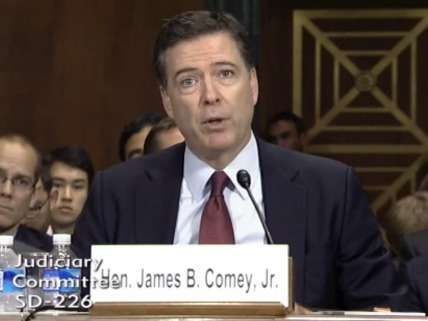FBI Director Blames 'Viral Videos' for Rising Murder Rates
- OurStudio

- May 12, 2016
- 3 min read

Senate Judiciary Committee
Yesterday FBI Director James Comey reiterated his argument that fear of ending up in a "viral video" has made police less aggressive, saying the phenomenon "could well be at the heart" of rising murder rates in some cities. Comey told reporters "there's a perception that police are less likely to do the marginal additional policing that suppresses crime—the getting out of your car at 2 in the morning and saying to a group of guys, 'Hey, what are you doing here?'"
Comey admitted he had no solid evidence that police have in fact become less aggressive or that, if they have, it has anything to do with increases in violent crime. And although he said his understanding of the situation is based on conversations with police officers, his comments drew a rebuke from James Pasco, executive director of the Fraternal Order of Police. "He ought to stick to what he knows," Pasco told The New York Times. "He's basically saying that police officers are afraid to do their jobs with absolutely no proof."
Nor is Comey's argument plausible, at least not the way he presents it. If it is simply good policing to ask a group of guys hanging out at 2 a.m. what they're up to, why would such an encounter be the stuff of a viral video? To attract a lot of negative attention online, the cop would have to do more than that. If he treated these (most likely) young black men disrespectfully, refusing to accept their explanations and insisting that they disperse under threat of arrest, that might do it. The incident also might get some attention if the cop tried to stop someone from recording it or used unnecessary violence, especially if that violence resulted in serious injury or death. But assuming that "marginal additional policing" is legal, effective, and unobjectionable, why would the possibility that it might be recorded lead to less of it?
Even if the problem Comey perceives were real, it's not clear what he wants to do about it, and the possibilities are unsettling. Courts and police departments across the country have recognized that Americans have a First Amendment right to record police officers as they perform their official duties in public, provided they do not interfere with the officers' work. But Comey's argument implies that recording cops is inherently disruptive because it has a chilling effect on perfectly appropriate and necessary policing activities. So even if a bystander with a cellphone is not, say, standing too close or intimidating witnesses, his very presence contributes to crime by instilling a fear of online ignominy in the hearts of brave yet easily cowed police officers. If so, dashcam videos recorded by the police themselves create the same hazard.
Another way to look at it, of course, is that watched cops are better cops. The knowledge that they might be recorded does have a deterrent effect, but in a good way: It deters quick tempers, recklessness, excessive force, illegal searches, and trumped-up charges. Furthermore, a video record can vindicate cops who are falsely accused of such abuses. In short, it is hard to see why conscientious cops would worry that their interactions with members of the public might be recorded, any more than conscientious blackjack dealers or bank tellers would. If they have nothing to hide, they have nothing to fear.




Comments